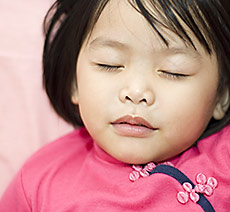Home » Polysomnography (Sleep Studies)
Polysomnography (Sleep Studies)
What is a polysomnogram?
A sleep study (also called a polysomnogram) is a way for your provider to diagnose possible sleep disorders. A sleep study measures your sleep cycles and stages by recording:
What happens during a sleep study?
After arriving and settling in, several electrode wires will be attached to your child’s head, chest, legs and face. The wires are attached with a sticky substance and they do not hurt. These wires help to monitor your child’s breathing, oxygen, brain waves, and heart rate. The wires must remain in place while your child sleeps in a bed in the Neurophysiology Lab all night. One parent or guardian is allowed to sleep in the room with the child. A specially trained health care provider will directly observe your child while they sleep and note any changes in breathing or heart rate. A video camera will record your child’s movements while they sleep.


